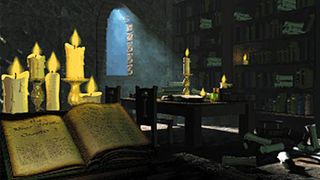The Elder Scrolls 2: Daggerfall nearly destroyed Bethesda: "If you weren't putting in 60 hours minimum, your job was in danger"
“It was potentially the end of Bethesda”

The Elder Scrolls 2: Daggerfall, released way back in 1996, was the second installment in what went on to become Bethesda’s beloved, genre-defining RPG series, but it sounds like it was a particularly tricky one to get off the launchpad - and that if it hadn’t come together it could have meant the end of the studio itself.
That’s according to a recent interview with former Bethesda dev Bruce Nesmith (embedded below), whose long career at the studio included roles as lead designer on The Elder Scrolls V: Skyrim and designer on Daggerfall. In response to interviewer Ben Hanson’s question about whether, if the project hadn’t come together, it might have meant the end of The Elder Scrolls, Nesmith claims, “It’s not just the end of Elder Scrolls, it was potentially the end of Bethesda.”
“The company had poured huge amounts of resources into it,” Nesmith goes on to explain. “There were opportunity costs involved because it was a very, very, very small studio, and so the fact that you can’t make another game because this is coming out - that really, really, really, really hurts.”
Elsewhere in the chat, Nesmith reflects on the launch of The Elder Scrolls 2 as “brutal” and agrees that it was “without any doubt” the toughest of his career. “[There were] close to 18 months’ worth of crunch,” he claims. “I mean, that’s just not sustainable. And then to release a game in the state it was released in? You know, we had admins screaming at us on a daily and weekly basis. If you weren't putting in 60 hours minimum, your job was in danger. It was bad.” He then adds: “It didn't help that we kind of believed in the game but could at the same time see what a mess it was.”
While Daggerfall launched to critical acclaim, it did indeed suffer from a fair few bugs to stomp out, as Bethesda director and executive producer Todd Howard has touched on before, explaining that the studio released seven patches and even had a dedicated patch team - a pretty big deal back in the dark ages of the mid-to-late-’90s. It seems the team’s passion and sense of the potential in Daggerfall pulled them through to the finish line, though, as Nesmith goes on to explain.
“If all you did was see was a mess, it’d be like, ‘toodles! I’ve got other places to be!’ But you look at it and you’re like, ‘this game could be amazing and awesome. It just needs more, and so you just kept committing yourself more.” Given Daggerfall’s extraordinary scope, with thousands of cities, towns, villages, and dungeons to explore, and revolutionary approach to the RPG genre in the freedom it gave to players, it’s not hard to imagine how difficult it must have been to get out the door, but also the passion devs must have felt about it getting there.
Chuckling as he reflects on how he became the go-to guy to talk to for stories about how tough things used to be developing the game back in the day, Nesmith laughs that it’s “strange because Todd has all the same stories. And probably a number that I don't.” 2002’s follow-up The Elder Scrolls III: Morrowind suffered from some of the similar worries as its predecessor, it seems, with Howard explaining in 2019 that that game had “a very difficult crunch” and that “there was this sense that if we don’t get the game done, and done well, we would be in trouble. Because it was kind of our last shot and our first shot, if that makes sense.”
Sign up to the GamesRadar+ Newsletter
Weekly digests, tales from the communities you love, and more
The rest, as they say, though, is history. Daggerfall made it, Morrowind also launched to critical and commercial success, and Bethesda went on to release the stupendously successful Skyrim - you might have heard of it - as well as The Elder Scrolls 4: Oblivion, Fallout 4, and most recently sci-fi spectacular Starfield (which GamesRadar+ scored a 5/5 in its review) among others. The head of Xbox Studios - which has since acquired Bethesda - Matt Booty has said that the Starfield studio no longer has a "crunch culture”. That was echoed by Howard in a 2019 interview in which he said the studio has “gotten much, much better at it, so now we’re at the point where we can really manage it, and we have enough people to move them between it, and I think that’s why people stay here.” Nesmith also praises Bethesda for its approach to helping devs recharge between projects elsewhere in the interview.
Nesmith also talks about Skyrim’s impact, saying that even more than GTA 3, Skyrim "proved to the world that open-world games were the place to be”.
Carrie is a former News Editor at PCGamesN, now a freelancer and writer based in the sunny UK. With a master’s in English Lit from Oxford, she has a special interest in dissecting narrative and characterisation, and exploring games’ unique powers for storytelling. She’s an RPG nut who’s never happier than when saving fantasy worlds, scorching foes with spells, and trekking virtual miles on her companions’ every whim. She’ll tell you just how many hundreds of hours she’s plugged into Baldur’s Gate 3, Divinity: Original Sin 2, The Witcher 3, and Skyrim if you ask really nicely. Also a Fable obsessive, so only mention it if you *really* want to lose a few hours of your own.
Most Popular





